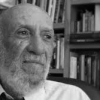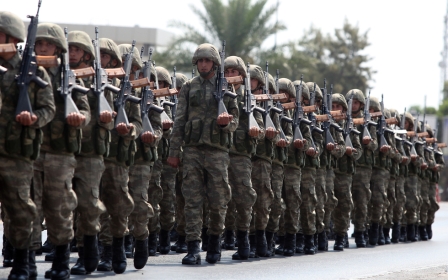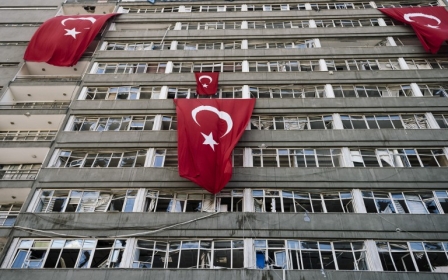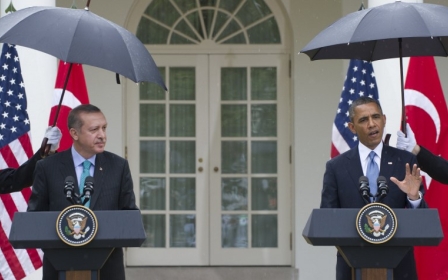It's not all bad news coming out of Turkey
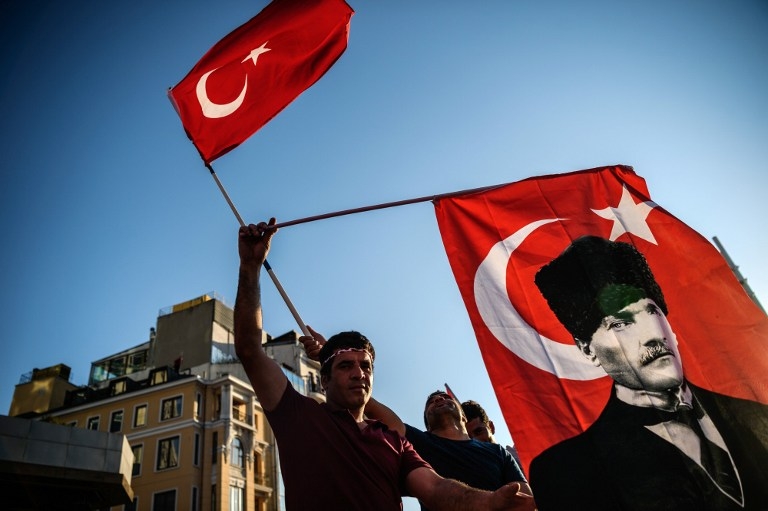
Being a witness to the political atmosphere in Turkey that has emerged after the failed coup puts me at odds with the secular consensus in the West, which looks up at the sky and sees only dark, ominous clouds of state oppression.
What I have experienced and observed so far is quite different, a sky with much blue in it. Let me explain.
There are two tendencies present that seemed to be responsive to the political priorities that top the post-coup government agenda: sustaining the anti-coup unity by shifting political gears within the AKP leadership circles in the direction of "inclusive democracy", and, with it, a retreat from the polarising claims of "majoritarian democracy" that greatly intensified after the 2011 national elections and were particularly evident in the clumsy, unacceptable way the Turkish government handled the Gezi Park demonstrations two years later.
The most important concrete embodiment of this post-15 July move toward inclusiveness has been a series of initatives intended to create a common front between the three leading political parties in the country, including the CHP (secular mainstream) and MHP (nationalist rightest) opposition parties.
The Ataturk effect
There is also a reinforcement of this development with clear evidence of an AKP readiness to exhibit an appreciation of Kemal Ataturk, which had been notably absent from the AKP political profile ever since it initially took power in 2002.
It was notable that Erdogan at his important press conference at the Istanbul Airport on the night of the attempted coup spoke below a giant portrait of Ataturk.
It was underscored by the dominance of large pictures of Erdogan and Ataturk, and no one else, behind the speaker stage at the huge 7 August Democracy Watch rally, and even more so by a long Ataturk quotation in the course of Erdogan’s speech, the highlight of the event.
This emphasis on Ataturk’s guidance has also been notable in the CHP effort to interpret the victory of Turkish democracy and patriotic fervour.
It should be understood that the image and thought of Ataturk are ways of expressing two realities: most significantly, an affirmation of the secularist orientation of the Turkish state, and also the recognition that Turkey was experiencing a supreme "patriotic moment" of national unity.
Learning from mistakes
In keeping with this welcome departure from the kind of toxic polarisation that had preceded the coup, has been the calm tone and restrained substance of Erdogan’s leadership.
In the domestic pro-AKP media, there have been references back to Erdogan’s then controversial advice to the Egyptian people to insist on a secular foundation for the governing process following the Tahrir uprising that overthrew Mubarak, a position at the time deeply resented by the Muslim Brotherhood as an intrusion on Egyptian internal politics.
Looking back, Egypt would likely have benefitted greatly if it had followed this advice, with the implication that Turkey’s present crisis was brought about by allowing the religiously oriented movement of Fetullah Gulen to penetrate so deeply into the sinews of government.
Of course, anti-AKP voices insist that Erdogan failed to adhere to his own guidelines, both by insinuating political Islam into the appointment and policy process of the Turkish state in recent years and also by striking an opportunistic bargain with Gulen forces that years earlier paved the way to religious influence within the Turkish state.
Perhaps it is possible to learn from this past while admitting mistakes (as Erdogan has done with reference to the Gulen movement).
'As many friends as possible'
Another facet of the present understanding of 15 July is the widespread agreement across the Turkish political spectrum that the US was involved to some degree.
To what degree is a matter of wildly divergent beliefs ranging from active complicity to passive support. There is even the opinion present in Turkey that the timing of the coup reflected US government nervousness about Ankara’s seeming turn toward Mosow, and at minimum, if the coup had succeeded, Washington would have shed few tears.
What lends some credibility to such suspicions is that a major foreign policy reset was underway and in motion prior to the coup attempt. It was centred upon diplomatic initiatives seeking to restore positive diplomatic and economic relations with Russia and Israel, and possibly even with Syria and Egypt.
Prospects for normalisation with Egypt took a turn for the worse as a result of Cairo’s seeming sympathy with the coup attempt and possible receptivity to an asylum request from Fettulah Gulen.
Yet what seems in many respects to be a second coming of Turkey’s pre-Arab Spring approach of "zero problems with neighbours" has been reformulated by the current prime minister, Binali Yıldırım, to: "as many friends as possible, and as few enemies."
This turn away from the sort of ideological foreign policy that has existed since 2011 may not be pleasing to hardliners in the US and Europe, but it certainly makes sense from the perspective of Turkish national interests.
Atmosphere of fear
Having considered the positive intimations about the Turkish future, let me mention a few negative features of the present atmosphere.
Erdogan mobilised mass street support on the night of the failed coup, and observers believed his call to occupy the city squares played a decisive role in turning the tide of battle that night.
But some fear that the nightly continuation of populist sentiments can lead the country back in the direction of majoritarian democracy and heightened polarisation, and something even worse if the temporary consensus starts to fray.
Also worrisome are the stories of mass arrests and suspensions involving many thousands of people, most of whom are viewed as probably innocent. There are also reports of torture and abuse involving those in detention, creating a widespread atmosphere of fear and intimidation, making people scared to voice their views.
Given the fresh memories of the coup attempt, its brutal violence, and the realistic worry that pro-coup elements remain strategically situated in the society, great pressure to strengthen internal security exists and should be interpreted with a measure of sympathy, or at least understanding.
There is some reason to be guardedly hopeful as individuals are being cleared and released, and the leadership has promised to proceed in accord with the rule of law, including making diligent efforts not to confuse Gulen conspirators with anti-AKP critics. It is encouraging in this regard that Erdogan, along with other Turkish leaders, has dropped several thousand cases based on a Turkish law that makes it a crime to insult the Turkish president and other public officials.
Populist pressure
There is also reason to be concerned about Erdogan’s demagogic efforts to mobilise populist pressures to restore capital punishment for the intended purpose of prosecuting and punishing Fetullah Gulen. It should be better appreciated that any attempted application of capital punishment to Gulen would be unacceptably retroactive.
Among other effects, such a prospect would create a legal pretext to deny the pending extradition request, which would create a storm of anti-American resentment in Turkey - what Americans might have felt after 9/11 if a supposedly friendly government had given safe haven to Osama Bin Laden.
The most shortsighted aspect of the current approach is the evident decision to stop short of including the pro-Kurdish political party, HDP or People’s Democratic Party, in the national unity approach, and the absence of any show of a willingness to renew a peace process with the Kurdish national movement, including representatives of the PKK.
Given ongoing concerns with the Islamic State (IS) group and spillovers from the Syrian war, the future of Turkey will seem far brighter if the Kurdish dimension can be constructively addressed.
What remains after this balancing act is lots of uncertainty, but enough evidence of positive tendencies, to raise a tenative banner of hope. Such a banner is also justified as a counter to the banner of despair and rage being waved so vigorously by anti-Erdogan zealots around the world with much support given by mainstream media.
- Richard Falk is an international law and international relations scholar who taught at Princeton University for forty years. In 2008 he was also appointed by the UN to serve a six-year term as the Special Rapporteur on Palestinian human rights.
The views expressed in this article belong to the author and do not necessarily reflect the editorial policy of Middle East Eye.
Photo: A demonstrator waves a national flag during a cross-party rally in Istanbul on 24 July to condemn the coup attempt against President Recep Tayyip Erdogan (AFP)
This article is available in French on Middle East Eye French edition.
New MEE newsletter: Jerusalem Dispatch
Sign up to get the latest insights and analysis on Israel-Palestine, alongside Turkey Unpacked and other MEE newsletters
Middle East Eye delivers independent and unrivalled coverage and analysis of the Middle East, North Africa and beyond. To learn more about republishing this content and the associated fees, please fill out this form. More about MEE can be found here.


